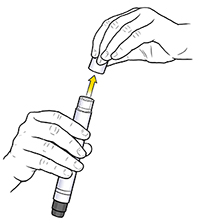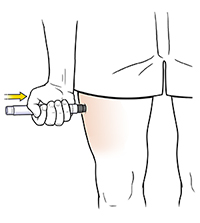Your health care provider has prescribed a medicine that you will need to inject through your skin. This is done with an autoinjector. It is a small device with a hidden needle. The needle is activated by a spring. This makes giving yourself a shot easy. It also makes it easy for someone else to give you a shot if you can’t do it yourself. There is no need to look for the best injection site or to give the shot in the buttocks or arm. Use any site on the outer side of your thigh. The shot can be given through clothing if necessary.
If your autoinjector is for emergency medicine, carry it with you at all times. Be sure your family members and friends know where to give the shot. Always have an autoinjector whose medicine has not expired. But in an emergency, it is better to use the expired medicine than to use none.
Home care
Inject your medicine as often as advised by your health care provider. Follow any instructions from your health care provider about the medicine. To give yourself a shot:
-
Remove the safety cap from the autoinjector. This activates it.
-
Point the tip of the autoinjector at the outer side of your thigh. Jab it against your thigh. This releases a spring-activated plunger that pushes the needle into the thigh muscle and gives you a dose of medicine. Hold the pen in place for
10 seconds. Then pull the pen straight out, away from the thigh, to remove the needle. Massage the area where you injected the medicine for about 10 seconds. -
Dispose of the autoinjector as instructed.
-
If your autoinjector is for emergency medicine (such as epinephrine for an allergic reaction), call
911 after using the autoinjector and get to the nearest emergency room. Don't drive yourself. Be aware that you may need a second injection in 5 to 15 minutes if you are still having the reaction or symptoms.
Follow-up care
Follow up with your health care provider as advised.
Call 911
Call
-
Racing pulse
-
Wheezing, coughing, or trouble breathing
-
Stomach cramping, diarrhea, or vomiting
-
Hoarse voice
-
Swollen lips, tongue, or throat
-
Trouble swallowing or feeling like your throat is closing
-
Itchy, blotchy skin or hives
-
Pale, cool, damp skin
-
Confusion
-
Drowsiness, fainting, or loss of consciousness



